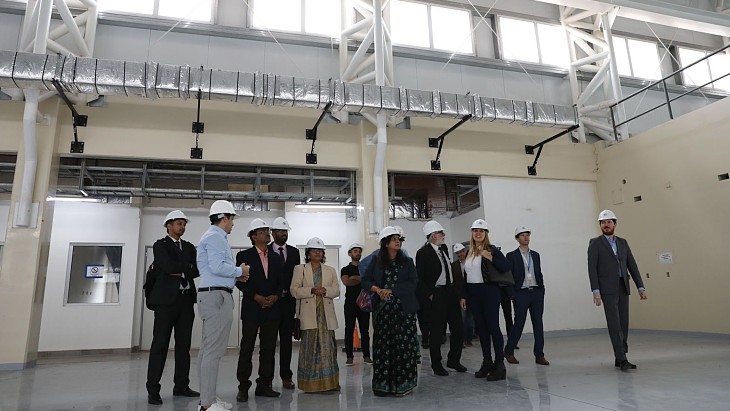
Adriana Serquis, president of Argentina's National Atomic Energy Commission (CNEA), said: "It is very valuable for the CNEA to receive today the visit of the delegation from India, not only to strengthen our cooperation ties in different areas related to nuclear medicine or reactors, but also so that they can get to know our facilities and workers, and the major priority projects that our institution is carrying out."
The Indian delegation was headed by the CEO of the Heavy Water Board, S Satyakumar. During the visit, CNEA said meetings were held to discuss areas including "nuclear medicine, space alloys, radioisotopes and heavy water".
Serquis said that, following the tour carried out in February to India, "we feel proud to be able to share what we do and have them tour our facilities". She said that being able to jointly face challenges was beneficial.
In August last year, CNEA and Argentina's INVAP completed the start-up of a radioisotope producing plant in Mumbai, India, in the highest profile result of the two countries' cooperation on peaceful use of nuclear technology so far.
Combustibles Nucleares Argentinos is in charge of supplying fuel for the country's three nuclear power units and its three research reactors. It is a joint venture between CNEA and the Pérez Companc Group.
The RA-10 project is being carried out by CNEA in conjunction with INVAP at the Ezeiza Atomic Centre near Buenos Aires. Civil works are due to be completed this year and commissioning is expected to begin in 2024, according to CNEA.
Argentina and India signed an Agreement on Cooperation in the Peaceful Uses of Nuclear Energy in 2010 and in 2019 signed a memorandum of understanding to "enhance and explore cooperative ventures" in civilian nuclear power and "bolster institutional linkages" in civilian nuclear research and development and capacity building.
In August last year, the two countries' foreign ministers issued a joint statement in which they noted bilateral cooperation on a variety of issues, saying "the two large and vibrant democracies, had elevated their relationship to the level of Strategic Partners in 2019" and "it was agreed to explore areas for deeper cooperation for peaceful uses of nuclear energy".
India has a largely indigenous nuclear energy sector with 22 operating reactors and eight under construction, with more planned. Argentina has three nuclear reactors, generating about 7% of its electricity. A locally-designed power reactor prototype, CAREM25, is currently under construction.